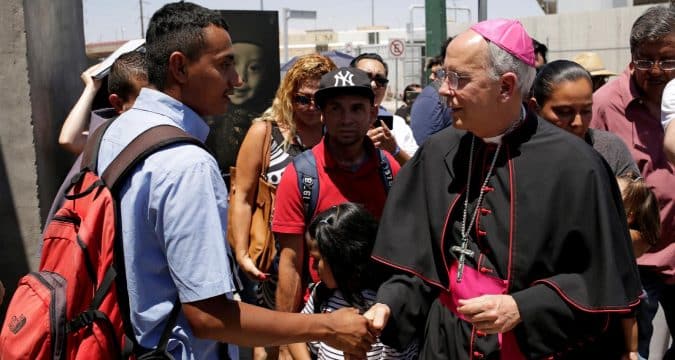
WASHINGTON (OSV News): Catholic immigration advocates in the United States sought ways to respond to some anti-immigration or false narratives about their work during a conference in Washington DC.
Participants in the event, “Understanding Migration from a Catholic Perspective” held at The Catholic University of America [CUA], examined current and historical narratives around US immigration, seeking new ways to dialogue with those skeptical about the Church’s work in this area, including some Trump administration officials.
“If the narrative is wrong, the actions that are based upon that narrative will be wrong,” said Bishop Mark Seitz of El Paso, Texas, in a keynote address.
Bishop Seitz, also the chairperson of the US Conference of Catholic Bishops’ [USCCB] Committee on Migration, said that some of the Trump administration’s actions on immigration should concern Catholics.
“I really don’t think we can over exaggerate the seriousness of these measures,” he said, expressing particular concern about a Trump administration policy rescinding long-standing restrictions on Immigration and Customs Enforcement agents from making arrests at what are seen as sensitive locations, including houses of worship, schools and hospitals, as well as the suspension of a federal refugee resettlement programme.
If the narrative is wrong, the actions that are based upon that narrative will be wrong
Bishop Seitz
The USCCB is in ongoing litigation with the federal government over the suspension of funding for refugee resettlement assistance and payments it says it has not yet received for completed work. The Trump administration also terminated two refugee resettlement agreements with the USCCB, the conference said.
Claims circulated by officials, including vice president, JD Vance, that the conference profits from that work were “shocking,” Bishop Seitz said.
“All I can really think of when I hear that kind of assertion is ‘Animal Farm’,” Bishop Seitz said in reference to the 1945 novella by George Orwell. “Because the truth is just turned upside down. You know, what is being done in a selfless way by so many dedicated people is characterised as just an effort to get money, like that’s what the Church is about? Not the Church I know.”
In a January interview [Sunday Examiner, February 9], Vance questioned the motives of the US bishops’ criticism of some of Trump’s immigration policies [Sunday Examiner, February 2], suggesting their objection to the suspension of a federal refugee resettlement programme had more to do with “their bottom line.” But outside audits of the bishops’ work with refugees show the USCCB does not profit from that work and, in fact, has spent the church’s funds to cover what the government would not.
The additional suspension of US foreign aid, Bishop Seitz added, presents another concern for those seeking to reduce “irregular migration.”
Because the truth is just turned upside down. You know, what is being done in a selfless way by so many dedicated people is characterised as just an effort to get money, like that’s what the Church is about? Not the Church I know
Bishop Seitz
Bishop Seitz said, “The drastic cuts to foreign aid, especially visible with the dismantling of USAID, has had devastating consequences. While this may not seem directly tied to migration, it is of central importance. Migration should be a choice, not a necessity. When people can build stable lives in their homeland, fewer are forced to depart their home country in search of a new home where they can better provide for their families. Investing in local economies, infrastructure and essential services is key to addressing the root causes of irregular migration.”
Julia Young, a historian of migration, Mexico and Latin America, and Catholicism at CUA, said during a panel discussion that there was a great wave of immigration to the United States that took place between about 1870 and 1910 of Irish, Italian, and Southern and Eastern European immigrants that led to significant demographic changes in the US and helped increase the Catholic population.
“Immigration surged to the point that the United States became a country where over 14 per cent of the population had been born in another country by 1910 which, interestingly, we’re again at that moment,” she said, noting that about 15 per cent of the population was born in another country.
Young said “as that immigration wave surged, there also surged a huge wave of nativism, nativist sentiment,” expressing concern that similar trends may again occur.
The drastic cuts to foreign aid, especially visible with the dismantling of USAID, has had devastating consequences. While this may not seem directly tied to migration, it is of central importance. Migration should be a choice, not a necessity
Bishop Seitz
But panellists also stressed that underlying concerns about issues including economic stability and cost of living, or other concerns tied to immigration issues should not be dismissed as nativism when advocating for migrants.
“I don’t think [calling it] racism is a very helpful response or answer to this kind of question,” Peter Skerry, a professor of political science at Boston College, said during a panel discussion.
“I don’t deny that racism exists, but I think as an answer, it’s much too vague, too facile and basically unfair to the situation and certainly unfair to our fellow citizens,” Skerry stressed, said of those who raise concerns about “real challenges.”
In considering challenges to the Church’s work with migrants, Bishop Seitz said, “I am a person of hope because I know who wins.”
The bishop said, “I believe that the Lord will not leave us,” adding, “And I don’t mean just wishful thinking, right? Hope is, for a Christian, not wishful thinking. I’m hopeful that this, in God’s plan, will become a moment of reawakening for our country, a recommitment to those principles that are the best of our country.”
The event was hosted by CUA, the USCCB’s Migration and Refugee Services and Jesuit Refugee Service/USA.








